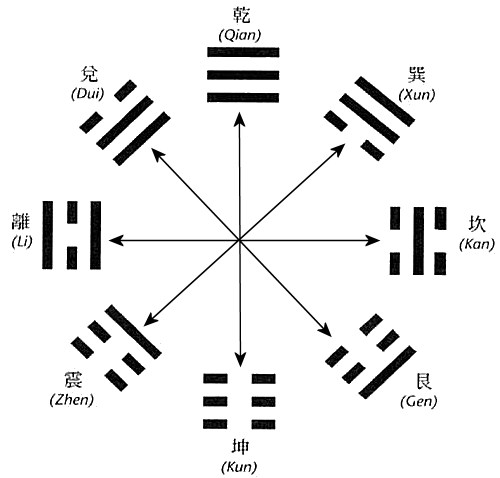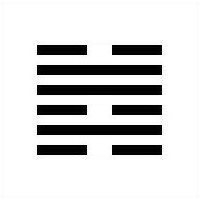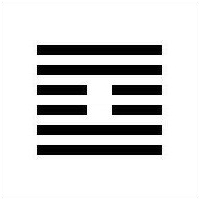The Absolute on this view is not to be grasped in conceptual form, but felt, intuited; it is not its conception, but the feeling of it and intuition of it that are to have the say and find expression
– Hegel, The Phenomenology of Spirit
Just because this vague intuition is of no help in directing our action on things, which action takes place exclusively on the surface of reality, we may presume that it is to be exercised not merely on the surface, but below
– Henri Bergson, Creative Evolution
The Unaccountability Machine by Dan Davies was published in 2024. It describes corporate culture using an example which seems trivial but isn’t. You complain to someone at a desk for unacceptable service. They resolve nothing, disguised with placating words, and it either escalates or you give up. This is often how society is structured, with psychological implications. The systems analysis Davies applies is good for mental health, and connects with I Ching philosophy.
The UK Post Office scandal was an example of the problem, exposing corporate inefficiency and ethical failure. There was evidence CEO Paula Vennells knew the Horizon accounting system was flawed but denied it. Inevitably some of what occurred was because of the corporation. But you think, well you knew about it, so why didn’t you say something? The consequences were devastating for sub-postmasters convicted of theft, fraud, and false accounting.
Davies refers to the cybernetic idea of the black box, which is a system impossible to understand you must evaluate accordingly. Corporations and computer algorithms are black boxes. We see the digital effect at X, Facebook, and with adverts in our email served up because of what we were browsing. We don’t know how the code injects into our experience, and there’s more of it coming.
This is now a means of production which Marx could never envisage and neither Musk nor Zuckerberg actually control. It’s a Frankenstein, about to increase exponentially, as computers scrape worldwide data and organise it with machine learning intelligence.
Some of the evasion is deliberate. Corporations protect themselves with systems of complexity that obscure responsibility. You can’t talk to the CEO with the power to refund the cost of your ticket. The man or woman at the desk cannot help, then refer you to a manager who is the same.
Triangulation is part of the problem. You realise the moment that happens is typically when a problem will not be resolved. Question the system, and you enter a black box of morally corrupt nonsense. Davies advises “more of the decisions that affect our lives are made not by people but by systems. Strange, alien intelligences with desires and drives quite different from our own.” I Ching hexagram 47 is called Exhaustion and Wilhelm explains “When one has something to say, it is not believed.”
By making their operations incomprehensible bureaucracies, governments, corporations and even academia protects itself from sensible scrutiny. Foucault-style universities were exposed with the Sokal Hoax. Basically, Alan Sokal wrote complete nonsense and it was academically accepted. This reflects in political jargon.
If you name something, and have ownership of that name, this gives you linguistic control over a person or action which is otherwise, but the words attach like mud. Howard Becker’s book Outsiders (1966) refers to his notion of labelling theory. Criminal and deviant behaviour, he said, is a matter of judgemental terminology. Now everyone throws mud using ideological words to deceive, destabilise, and smear. It makes sense to the people who do it as part of their warring system. But it’s not part of normal reality when:
The writer either has a meaning and cannot express it, or he inadvertently says something else, or he is almost indifferent as to whether his words mean anything or not. This mixture of vagueness and sheer incompetence is the most marked characteristic of modern English prose, and especially of any kind of political writing. As soon as certain topics are raised, the concrete melts into the abstract (George Orwell, Politics and the English Language).
Concrete becoming abstract is a fine observation. Responsibility is diffused across systems, to the extent that it doesn’t exist. The purpose of the system is self maintenance, resisting challenges and external questions. When problems arise, organisations reply with policy statements which are not real answers. These dynamics cause catastrophic failure, like the financial crisis of 2008.
For the human spirit, which is where the I Ching becomes relevant, it’s a depressing situation. It causes inertia when systems pass responsibility up and down a chain so no one is accountable. Everyone sees it, and you feel a strange sense of unreality and dishonesty.
Davies refers to Donald Trump as part of his study and I agree with his comments. I’m wary of Trump as many people are. But he doesn’t like the governmental and media system, and seventy four million people agree. We know what it’s like being trapped in a lie machine.
Systems present themselves as rational and efficient, and Davies explains how this is a facade. They are filled with human error, conflicts of interest, a lack of coherence and transparency. The machine sustains itself despite poor results and in extreme form, obvious corruption.
These situations damage human spirit. In Chinese philosophy the word hsin means heart-mind and it takes a battering in today’s world. You know you are right, and they are wrong, but it makes no difference. In Sources of Power: How People Make Decisions, Gary A. Klein affirms what you know inside but cannot express:
Intuition depends on the use of experience to recognize key patterns that indicate the dynamics of the situation. Because patterns can be subtle, people often cannot describe what they noticed.
In Ideas, a study of phenomenology, Edmund Husserl clarifies the holistic quality of this perception which is a fine description of I Ching knowing. This elegant diagram summarises the system which is:
Corresponding at all points to the manifold data of the real.

The eight trigrams are a representation of all phenomena occurring in different energetic form. Part of which is the representation of open yin and closed yang which is inside, outside, from above, below, or in the centre. There are many ways this can be applied, which I allude to here as a map of mood and outlook.
In The Primary Way, a study of the I Ching, Professor Chung-Ying Cheng clarifies intuition more precisely:
It is not intellectual intuition focusing on a transcendent object but an empirical and yet intellectual grasp of the whole of experience, as much as we can make out, intended to cover all things in the world.
This is I Ching knowing. We obtain it for questions, which accrues as intuitive and philosophical understanding not confined to the moment. Davies refers to an information management model with five components which are roughly operations, regulation, integration, intelligence and philosophy. That’s a big subject I won’t explore now except to point out two important factors.
Firstly, there is a connection with the Chinese five phases I describe here. Secondly, the fifth component is the defining principle related to human identity. This is why philosophy is important for the I Ching. Because philosophy, related to identity, is our orientation for living.
Corporate, governmental, academic and regulatory systems become entangled in their own rules and process. Structurally speaking, society is a chaotic mess. But “you gotta dance” said Haruki Murakami. “Those who were seen dancing were thought to be insane by those who could not hear the music” said Nietzsche. “Dancing is always connected with creation,” said Carl Jung.
In Luc Besson’s Leon, lead actor Gary Oldman loves Beethoven. There is a fun musical moment in the television series Slow Horses showing defiance against the system, in this case MI5 control. The relaxed disregard is a joy. Lethal threat, but I don’t care. We are all Jackson Lamb. Very simply, because it’s a very British scene, he takes the piss with an irresistible tune.
Walking 500 miles is like “perseverance furthers” in the I Ching (and reminds me of long walks in the Pyrenees). Hexagram 61 is called Inner Truth and Davies makes comments about information theory which are similar to philosophical advice about the Tao:
The capacity of a communication channel to transmit a message is clearly going to bear some sort of relationship to the capacity of a control system to respond to disturbances.
A given system has the potential to achieve stability only if every source of variability from the environment is matched by an equal or greater source of variety in the regulatory system
Compare those lines to Chapter 2 of the Tao Te Ching:
Under heaven all can see beauty as beauty only because there is ugliness.
All can know good as good only because there is evil.
Therefore having and not having arise together.
Difficult and easy complement each other.
Long and short contrast each other:
High and low rest upon each other
Davies makes a related remark which is additionally interesting, because it is additionally complex:
You are always attenuating variety in some way or other, unless you are describing a system that consists of everything in the universe.
Change is the constant factor of the I Ching, which in information theory is posited in terms of channels, relations, and adjustments. This is everything in the universe. Although there is also a quiet centre (see hexagram 52) where you observe while being unmoving yourself.
Part of the problem is there is no incentive to question a system which pays a salary and provides a daily structure. It’s not a malicious situation, but it is insufferably dumb. Davies explains how there are layers of rules, hierarchies, and procedures used to mitigate risk and ensure compliance, as if we are no more than pawns.
Important decisions, made by the higher ups, are delayed or lost in loops of consultation, paperwork, and committees. No one in the system feels responsible so failures become collective not individual. Resignations, as with Paula Vennells, satisfy outrage and are entirely correct; but we know it wasn’t only about her.
Decisions in large systems are made with incomplete information. This is part of the plot line in Slow Horses and the crime genre. In the defence industry, Davies observes how projects are continued after their original purpose becomes irrelevant. The contract becomes the purpose, sustaining a bureaucracy not national security. The rivers and lakes of Britain are appallingly polluted after years of neglect while water industry share holders, and utility executives, pocketed large sums of money.
The human experience in relation to these systems is what Engels described as alienation. We don’t control this means of production, and actually no one does; so we return to the Frankenstein metaphor. Digital algorithm governance takes what we already have and makes it worse.
Reform is very limited, Davies argues, creating new layers of bureaucracy which are itself the problem. Everyone likes the NHS but its performance and efficiency are poor compared to health systems in Europe. When the world was locked down with Covid, people said this is an opportunity to rethink our cities. Look how much better they are when they are quiet, the air cleaner, changing the quality of light. Can we install more green spaces, trees, cycle paths, and work more at home. I knew it wouldn’t happen. When the systems fire up again, nothing will change.
What we need, Davies suggests, is a cultural shift toward personal accountability and ethical leadership. This connects with the sociology of religion (not the theology) whereby
For nearly all of history, there have been two kinds of authority taking the big decisions affecting people’s lives. There is a fundamental distinction between ‘kings’ and ‘priests’. A king might be more powerful, but his orders can be argued against – it might be inadvisable to do so, but if you can change the king’s mind you can change the decision. The priest, on the other hand, gains his authority from his status as the interpreter of the Word of God, so his decisions are considerably more difficult to reverse. This means that it matters a great deal which kinds of decisions are given to which kinds of authorities (Davies)
I am critical of all religion, which is itself subject to systems analysis where they create intolerance, oppression, and social control. They do have an ostensible ethical function, although this too becomes corrupt or is fundamentally questionable. In The Godfather, Michael Corleone builds relations with the Catholic church for shared nefarious interests. One of the Slow Horses stories concerns Islamic violence, which now occurs in Europe; and we see appalling treatment of women.
The answer again is personal accountability, not a system, for which the I Ching is a useful guide. This is consistent with Nietzsche’s notion of slave morality where values are dictated by others not found within. Collective abdication at work and within religion is essentially the same thing. We cling to false certainties of belief, ideology, and tradition.
In The Unaccountability Machine, we see how bureaucratic systems strip individuals of agency and creative function. Nietzsche told us about the Superman who is not a pawn, king, or priest, who are dictated to or do the dictating according to flawed notions of reality.
Alongside structural observation, we can consider the human experience of confining systems. The Trial, by Franz Kafka, is the basis for the term Kafkaesque, commonly understood even if you haven’t read the book. Systems are inscrutable, individuals are powerless, and justice is unattainable.
Josef K. is arrested and prosecuted by a mysterious court without being informed of the charges. Journalist Allison Pearson was visited by UK police for a supposedly offending year old tweet without being told which it was or who had complained. Parallels occur in the workplace. I know this from experience. Not knowing what it was about became part of imposed guilt.
Then I remembered, a few days later. I addressed a problem intelligently, not of my making, changing the priority of expected practice. Which sounds serious, but it was utterly menial. I am not a number, Six says in The Prisoner. But he is, so they laugh at him, and he cannot escape, the later version with Ian McKellen better than the original series.
In Kafka’s novel, the court is concerned not with delivering justice but maintaining the hidden process. Josef K. trying to navigate the system is a literary example of a real problem. In Kafka’s world no one can explain who is in charge, how decisions are made, or even what the rules consist of. The result is powerlessness and alienation, subjected to an impersonal machine. You are dehumanised, because “When one has something to say, it is not believed.”
There are I Ching writings for systems such as the Tao of Organisation by Thomas Cleary. But some hexagrams are particularly relevant and I will describe more deeply the importance of 47 and 61.
 |
 |
Hexagram 47 is called Oppression or Exhaustion and “When one has something to say, It is not believed” is the Judgement. The preceding hexagram 46 is Pushing Upward. When this changes to 47, circumstances block and confine making you powerless. At 46 you start a job with enthusiastic energy. At 47, after a few years of it, you are trapped, tired, and disillusioned.
In times of oppression, inner strength is vital. You can’t express outside, so find integrity inside. Read books about strategy, such as 48 Laws of Power by Robert Greene. Law 9, he says, is winning through your actions not with words because:
Even the best argument has no solid foundation, for we have all come to distrust the slippery nature of words. And days after agreeing with someone, we often revert to our old opinion out of sheer habit.
The upper trigram of 47 is Lake, representing cheerfulness, above the lower trigram of Water meaning danger. The nuclear trigrams are Wind and Fire representing gentle influence and clarity. You must understand the situation and not allow it to damage you emotionally; not oppose it which is futile.
Hexagram 61 is called Inner Truth and this is a time, and an environment, where you have to protect your real inside against the hard outside. The nuclear trigrams are Mountain and Thunder suggesting there is a great power in philosophical awareness and I Ching knowing, although you must keep it hidden. Walk in the park, listen to birds, watch a fox watching the world.
I write like this is a magazine column. With research, references, and a lot of time. If you like it, perhaps you would support me.
